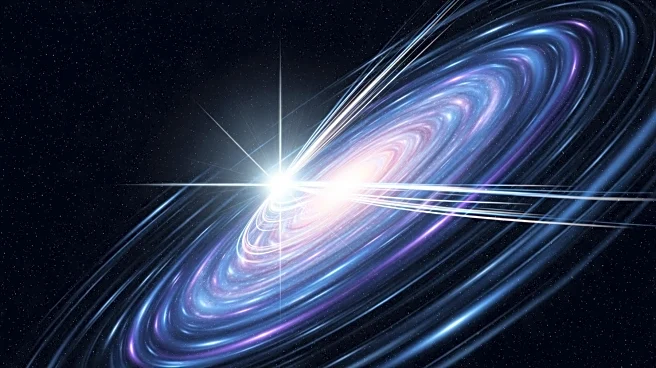What's Happening?
A recent study published in Physical Review Letters reveals that the solar system is moving through the galaxy at a velocity three times faster than previously believed. Researchers at Bielefeld University in Germany utilized radio telescope data to measure
this motion, challenging existing cosmological models. The study indicates that the solar system's speed as it orbits the Milky Way is significantly higher than earlier calculations, which could have profound implications for the Lambda Cold Dark Matter model that has been a cornerstone of cosmology. The research team observed a directional imbalance in radio galaxies, suggesting a cosmic 'headwind' effect, which was more pronounced than expected. This discovery raises questions about the uniformity of radio galaxy distribution and the behavior of large-scale cosmic structures.
Why It's Important?
The findings from this study could lead to a reevaluation of fundamental cosmological models, particularly the Lambda Cold Dark Matter model. If the solar system is indeed traveling at this newly calculated speed, it may necessitate a reassessment of the cosmic microwave background dipole, which is crucial for understanding the universe's large-scale structure. The study presents a 5-sigma deviation from expected values, indicating a significant discrepancy that challenges current theories. This could impact how scientists interpret cosmic phenomena and the distribution of matter in the universe, potentially leading to new insights into the behavior of galaxies and cosmic structures.
What's Next?
The scientific community is likely to scrutinize these findings further, with potential revisions to existing cosmological models. Researchers may conduct additional studies to confirm the solar system's velocity and explore its implications for the cosmic microwave background dipole. This discovery could prompt new investigations into the distribution of radio galaxies and the uniformity of cosmic structures, potentially leading to a deeper understanding of the universe's dynamics.
Beyond the Headlines
The study's implications extend beyond immediate scientific circles, potentially influencing philosophical and theoretical perspectives on the universe's structure. The challenge to established cosmological models may inspire new theories and debates about the nature of cosmic phenomena. Additionally, the use of radio telescope data highlights the importance of technological advancements in astronomy, which continue to provide clearer insights into the universe's mysteries.

















